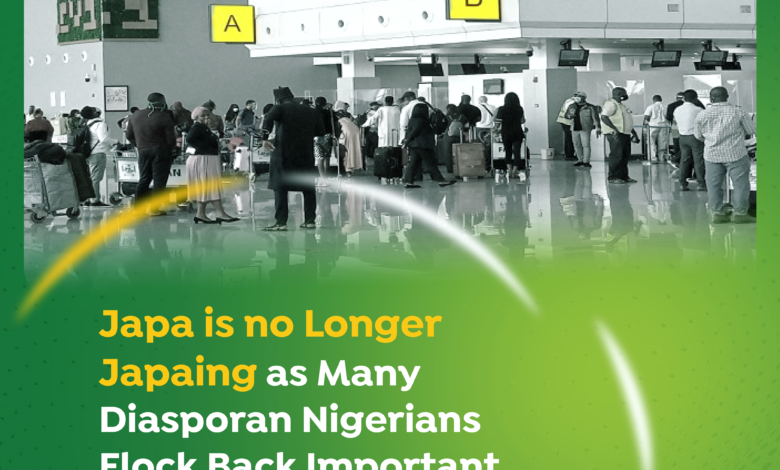Japa is No Longer Japaing as Many Diasporan Nigerians Flock Back for Important Reasons

Japa, a word popularized by Nigerian youths, netizens, and contemporary professionals, originates from the Yoruba language, meaning “to run away or leave a place in a haste.” In recent times, it has morphed into a reference to migration, symbolizing “leaving one’s country” by any means necessary. This phenomenon is largely fueled by various economic factors, including insecurity, professional misconduct and misappropriation, public unrest, governmental mismanagement, etcetera.
A more corporately acceptable term is Brain Drain, which means the emigration of highly skilled and educated individuals from one country to another, typically to seek better opportunities, higher salaries, or improved living conditions. In Nigeria specifically, the health sector has been witnessing a significant brain drain in recent years, particularly evident in the exodus of medical doctors and nurses.
Statistics paint a troubling picture. The World Bank’s 2007 report revealed that over 44 percent of African citizens who completed their studies abroad, especially PhDs, did not return to Africa. More recent data, UK immigration report in 2022, put the number of Nigerian healthcare professionals granted working visas in the UK in 2021 at 13,609. Also, between December 2021 and May 2022, a total of 727 Nigerian-trained medical doctors relocated to the UK. The statistics signals a severe brain drain and spells bad for a country that aims for growth and development, especially in such sensitive sector as health.
To curb brain drain, experts emphasize the importance of the government providing suitable working conditions, better tools, adequate salaries, and incentives for medical practitioners. They recommend increasing the capacity for health workforce training, investing in health technology and telemedicine, fixing infrastructure and basic amenities, and addressing insecurity plaguing the nation.
Despite the concerning trend of professionals leaving, there is a glimmer of hope. Nigerians in the diaspora are increasingly returning home for medical procedures, drawn by the cost-effectiveness and shorter waiting times compared to countries like Canada, the UK, and the US. This suggests that while the Nigerian health sector faces its own fair share of challenges, it also possesses potentials that could be exploited for growth and improvement.
In a significant move, President Bola Tinubu recently approved the immediate upgrade of 16 health institutions across all six geopolitical zones in Nigeria. This modernization initiative, including the establishment of oncology and nuclear medicine centers, aims to overhaul the healthcare sector and make world-class cancer diagnosis and care accessible to all Nigerians.
Furthermore, the federal government’s memorandum of understanding with the African Export- Import Bank, Afrexim, for a $1 billion healthcare investment facility signifies a commitment to meeting the health needs of citizens. With the establishment of the Africa Medical Centre of Excellence in Abuja, scheduled for commissioning in 2025, Nigeria is poised to lead in quality and accessible healthcare systems on the continent.
For the Nigerian health sector, the future looks promising, fueled by the dedication of practitioners and the renewed attention from the government and stakeholders. As the nation marches towards a brighter healthcare landscape, the adaptability of its people shines through, offering hope for a healthier and more prosperous future for all.





